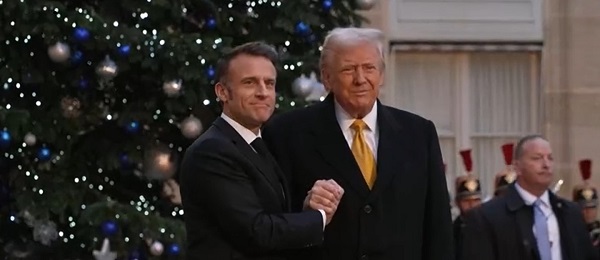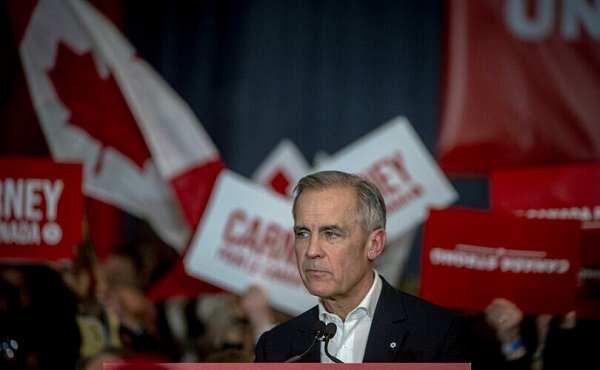Daily Caller
International Energy Agency should go on Trump’s Chopping Block

French President Macron has called the IEA the ‘armed wing for implementing the Paris Agreement

From the Daily Caller News Foundation
By David Blackmon
Among the many promises and commitments that he has made during his ongoing transition period, President-elect Donald Trump has pledged to pull U.S. support for the World Health Organization and cancel its commitments related to the 2015 Paris Climate Agreement. If a new report issued this week by the Senate Committee on Energy and Natural Resources and incoming chairman Republican Wyoming Sen. John Barrasso, is any guide, Trump perhaps should add U.S. support for the International Energy Agency to his growing list of cancellation opportunities.
“French President Macron’s observation that IEA has become the ‘armed wing for implementing the Paris Agreement’ is regrettably true,” said the report. “With the many serious energy security challenges facing the world, however, IEA should not be a partisan cheerleader. What the world needs from IEA—and what it is not receiving now—is sober and unbiased analyses and projections that educate and inform policymakers and investors. IEA needs to remember why it was established and return to its energy security mission.”
The IEA was established in 1974 in response to the first Arab Oil Embargo which resulted in dramatically higher prices for crude oil and gasoline at the pump. Originally supported by 31 member countries including the United States, the agency’s mission was to provide accurate information related to global oil supply and demand which subscribing countries could use to help form effective energy policies. That original mission held firm for decades, during which the IEA was widely considered a leading source of real, unbiased energy information.
But politics tends to corrupt everything it touches, and the IEA has unfortunately proved to be no exception to that rule. As the politics surrounding climate alarmism rose to new highs following the signing of the Paris Climate Agreement, the agency came under increasing pressure to radically alter its mission from that of a provider of real information worthy of trust to more of an activist posture.
In 2020, the report notes, this led to a shift in the IEA’s mission statement and to a new design to its modeling processes that form the basis for its annual World Energy Outlook. As its modeling base case, the agency abandoned its longstanding Current Policies Scenario, which Barrasso’s report describes as “essentially a ‘business as usual’ reference case,” in favor of a more aggressive Stated Policies Scenario.
Barrasso’s report describes this new scenario as “a hypothetical outlook based on unimplemented policies and grounded in unrealistically optimistic assumptions about the pace and scale of the transformation, especially concerning the adoption of electric vehicles by consumers.” It is an approach intentionally designed to introduce bias into the modeling process, and thus into the IEA policy recommendations for which the modeling process serves as the foundation.
This inevitable bias had an immediate and very noticeable effect. In a report published by the IEA in May 2021 Executive Director Fatih Birol laughably stated that “there will not be a need for new investments in oil and gas fields” and urged oil and gas producers to halt investments in exploration and development of new oil reserves. But that was before oil prices exploded as global demand exceeded supply during the recovery from the COVID pandemic, and by August Birol had completely reversed himself, joining President Joe Biden in a desperate call for more oil drilling to help resolve the situation.
Obviously, this sort of flip-floppery does severe damage to the agency’s already crumbling credibility as well as to the justification for governments to continue pouring millions of dollars into its operations each year. Barrasso’s report correctly notes that the IEA’s “reputation has lost its luster.”
Barrasso’s report is blunt about the kinds of reforms he would like to see at the IEA, urging Birol to abandon its advocacy posturing against investments in oil, natural gas, and coal, and to “once again produce for its World Energy Outlook a real unbiased, policy-neutral ‘business as usual’ reference case of the kind the Energy Information Administration produces.”
The Wyoming senator stops short of calling for the U.S. defunding of the IEA, but the agency’s currency is information. If that currency has lost its value, then perhaps Trump should consider a more aggressive approach.
David Blackmon is an energy writer and consultant based in Texas. He spent 40 years in the oil and gas business, where he specialized in public policy and communications.
Business
Scott Bessent Says Trump’s Goal Was Always To Get Trading Partners To Table After Major Pause Announcement


From the Daily Caller News Foundation
By
Secretary of the Treasury Scott Bessent told reporters Wednesday that President Donald Trump’s goal was to have major trading partners agree to negotiate after Trump announced a 90-day pause on reciprocal tariffs for many countries after dozens reached out to the administration.
Trump announced the pause via a Wednesday post on Truth Social that also announced substantial increases in tariffs on Chinese exports to the United States, saying 75 countries had asked to talk. Bessent said during a press event held alongside White House press secretary Karoline Leavitt that Trump had obtained “maximum leverage” to get trading partners to negotiate with the April 2 announcement of reciprocal tariffs.
“This was his strategy all along,” Bessent told reporters during an impromptu press conference at the White House. “And that, you know, you might even say that he goaded China into a bad position. They, they responded. They have shown themselves to the world to be the bad actors. And, and we are willing to cooperate with our allies and with our trading partners who did not retaliate. It wasn’t a hard message: Don’t retaliate, things will turn out well.”
Dear Readers:
As a nonprofit, we are dependent on the generosity of our readers.
Please consider making a small donation of any amount here.
Thank you!
WATCH:
China imposed retaliatory tariffs on American exports to the communist country Wednesday, imposing an 84% tariff on U.S. goods after Trump responded to a 34% tariff by taking American tariffs to 104%.
“Based on the lack of respect that China has shown to the World’s Markets, I am hereby raising the Tariff charged to China by the United States of America to 125%, effective immediately,” Trump said. “At some point, hopefully in the near future, China will realize that the days of ripping off the U.S.A., and other Countries, is no longer sustainable or acceptable.”
“They kept escalating and escalating, and now they have 125% tariffs that will be effective immediately,” Bessent said during the press conference.
Bessent said that China’s actions would not harm the United States as much as it would their own economy.
“We will see what China does,” Bessent said. “But what I am certain of, what I’m certain of, is that what China is doing will affect their economy much more than it will ours, because they have an export-driven, flood the world with cheap export model, and the rest of the world now understands.”
The Dow Jones Industrial average closed up 2,962.86 points Wednesday, with the NASDAQ climbing by 1,755.84 points and the S&P 500 rising 446.05 points, according to FoxBusiness.
Banks
Wall Street Clings To Green Coercion As Trump Unleashes American Energy


From the Daily Caller News Foundation
By Jason Isaac
The Trump administration’s recent move to revoke Biden-era restrictions on energy development in Alaska’s North Slope—especially in the Arctic National Wildlife Refuge (ANWR)—is a long-overdue correction that prioritizes American prosperity and energy security. This regulatory reset rightly acknowledges what Alaska’s Native communities have long known: responsible energy development offers a path to economic empowerment and self-determination.
But while Washington’s red tape may be unraveling, a more insidious blockade remains firmly in place: Wall Street.
Despite the Trump administration’s restoration of rational permitting processes, major banks and insurance companies continue to collude in starving projects of the capital and risk management services they need. The left’s “debanking” strategy—originally a tactic to pressure gun makers and disfavored industries—is now being weaponized against American energy companies operating in ANWR and similar regions.
Dear Readers:
As a nonprofit, we are dependent on the generosity of our readers.
Please consider making a small donation of any amount here. Thank you!
This quiet embargo began years ago, when JPMorgan Chase, America’s largest bank, declared in 2020 that it would no longer fund oil and gas development in the Arctic, including ANWR. Others quickly followed: Goldman Sachs, Wells Fargo, and Citigroup now all reject Arctic energy projects—effectively shutting down access to capital for an entire region.
Insurers have joined the pile-on. Swiss Re, AIG, and AXIS Capital all publicly stated they would no longer insure drilling in ANWR. In 2023, Chubb became the first U.S.-based insurer to formalize its Arctic ban.
These policies are not merely misguided—they are dangerous. They hand America’s energy future over to OPEC, China, and hostile regimes. They reduce competition, drive up prices, and kneecap the very domestic production that once made the U.S. energy independent.
This isn’t just a theoretical concern. I’ve experienced this discrimination firsthand.
In February 2025, The Hartford notified the American Energy Institute—an educational nonprofit I lead—that it would not renew our insurance policy. The reason? Not risk. Not claims. Not underwriting. The Hartford cited our Facebook page.
“The reason for nonrenewal is we have learned from your Facebook page that your operations include Trade association involved in promoting social/political causes related to energy production. This is not an acceptable exposure under The Hartford’s Small Commercial business segment’s guidelines.”
That’s a direct quote from their nonrenewal notice.
Let’s be clear: The Hartford didn’t drop us for anything we did—they dropped us for what we believe. Our unacceptable “exposure” is telling the truth about the importance of affordable and reliable energy to modern life, and standing up to ESG orthodoxy. We are being punished not for risk, but for advocacy.
This is financial discrimination, pure and simple. What we’re seeing is the private-sector enforcement of political ideology through the strategic denial of access to financial services. It’s ESG—Environmental, Social, and Governance—gone full Orwell.
Banks, insurers, and asset managers may claim these decisions are about “climate risk,” but they rarely apply the same scrutiny to regimes like Venezuela or China, where environmental and human rights abuses are rampant. The issue is not risk. The issue is control.
By shutting out projects in ANWR, Wall Street ensures that even if federal regulators step back, their ESG-aligned agenda still moves forward—through corporate pressure, shareholder resolutions, and selective financial access. This is how ideology replaces democracy.
While the Trump administration deserves praise for removing federal barriers, the fight for energy freedom continues. Policymakers must hold financial institutions accountable for ideological discrimination and protect access to banking and insurance services for all lawful businesses.
Texas has already taken steps by divesting from anti-energy financial firms. Other states should follow, enforcing anti-discrimination laws and leveraging state contracts to ensure fair treatment.
But public pressure matters too. Americans need to know what’s happening behind the curtain of ESG. The green financial complex is not just virtue-signaling—it’s a form of economic coercion designed to override public policy and undermine U.S. sovereignty.
The regulatory shackles may be coming off, but the private-sector blockade remains. As long as banks and insurers collude to deny access to capital and risk protection for projects in ANWR and beyond, America’s energy independence will remain under threat.
We need to call out this hypocrisy. We need to expose it. And we need to fight it—before we lose not just our energy freedom, but our economic prosperity.
The Honorable Jason Isaac is the Founder and CEO of the American Energy Institute. He previously served four terms in the Texas House of Representatives.
-

 John Stossel2 days ago
John Stossel2 days agoGovernment Gambling Hypocrisy: Bad Odds and No Competition
-

 Alberta2 days ago
Alberta2 days agoAlberta’s embrace of activity-based funding is great news for patients
-

 2025 Federal Election1 day ago
2025 Federal Election1 day agoCommunist China helped boost Mark Carney’s image on social media, election watchdog reports
-

 2025 Federal Election1 day ago
2025 Federal Election1 day agoFifty Shades of Mark Carney
-

 2025 Federal Election2 days ago
2025 Federal Election2 days agoMark Carney pledges another $150 million for CBC ahead of federal election
-

 Energy1 day ago
Energy1 day agoTrump signs four executive orders promoting coal industry
-

 2025 Federal Election1 day ago
2025 Federal Election1 day agoConservative Party urges investigation into Carney plan to spend $1 billion on heat pumps
-

 2025 Federal Election14 hours ago
2025 Federal Election14 hours agoRCMP memo warns of Chinese interference on Canadian university campuses to affect election









